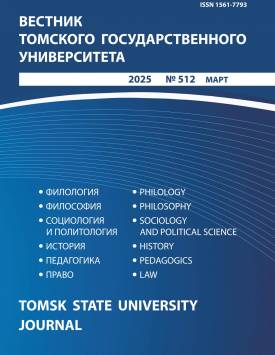Sociocultural professionally-oriented project as a means of forming foreign students' extralinguistic knowledge in linguistics
The authors substantiate the possibility of using a socio-cultural professionally-oriented project as a means of forming extralinguistic knowledge in foreign students-linguists. The relevance of the study is due to the growing number of foreign students majoring in linguistics, which requires finding optimal ways to organize not only language, but also intercultural training in a Russian university. The aim of the scientific work is to study the possibilities of using a socio-cultural project as a means of professionally-oriented training of foreign students-translators in Russian language classes in the 1 st year. Based on the theoretical review and the authors' pedagogical experience, it is concluded that the most important component of linguistic education is the formation of the ability for intercultural communication. Particular attention is paid to the problem of integrating foreign linguistic students into the Russian socio-cultural environment by forming a baggage of extralinguistic knowledge and active professionally-oriented project activities. The use of a socio-cultural professionally-oriented project is proposed as one of the didactic tools. The article reveals the concept of a socio-cultural professionally-oriented project, provides examples of projects integrated into the discipline "Oral Speech Practice", and describes the final products. Thematic groups of extralinguistic knowledge that are formed in the course of project activities are identified: social and everyday, ethno-cultural, informational and social, and general professional knowledge. As a unit of selection of extralinguistic knowledge, it is proposed to use a unit-component, which is revealed by a set of verbal, non-verbal, extraverbal, and metaverbal ways of its representation. The article describes in detail the step-by-step technological implementation of socio-cultural professionally oriented projects in four phases: pre-project, indicative, implementing, and final. Examples of pre-project and project tasks and socio-cultural maps are given. As evidence of the effectiveness of using socio-cultural professionally-oriented projects for the formation of extralinguistic knowledge in foreign students, the results of the qualimetric analysis of test tasks completed by students in the experimental and control groups are presented. The study found that the use of sociocultural professionally-oriented projects in teaching Russian as a foreign language to studens-translators allows developing research skills, stimulating creative activity and initiative in searching for original topics and solutions, promoting the acquisition of experience in intercultural interaction, developing professionally significant extralinguistic knowledge and increasing motivation for future professional activities. The authors declare no conflicts of interests.
Keywords
professional adaptation, sociocultural adaptation, foreign students, Russian as a foreign language, unit-component, extralinguistic knowledge, sociocultural professionally-oriented projectAuthors
| Name | Organization | |
| Zhdanova Maria V. | Perm National Research Polytechnic University | malk.maria@mail.ru |
| Alikina Elena V. | Perm National Research Polytechnic University | alikina@pstu.ru |
| Chernikova Irina Yu. | Perm National Research Polytechnic University | iyuchernikova@pstu.ru |
References

Sociocultural professionally-oriented project as a means of forming foreign students' extralinguistic knowledge in linguistics | Vestnik Tomskogo gosudarstvennogo universiteta – Tomsk State University Journal. 2025. № 512. DOI: 10.17223/15617793/512/20
